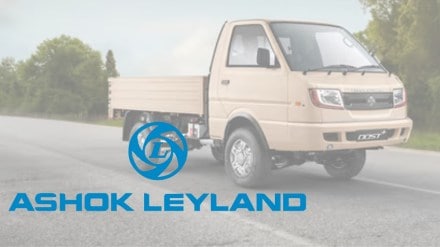Ashok Leyland on Wednesday reported a nearly flat standalone net profit of Rs 771.06 crore for the second quarter of FY26 as muted domestic demand weighed on growth across vehicle categories. The commercial vehicle (CV) maker had posted a profit of Rs 770.10 crore in the same period a year ago.
Standalone revenue from operations grew 9% year-on-year to Rs 9,588.18 crore. Profit before exceptional items and tax stood at Rs 1,083 crore, up 23% from Rs 878 crore a year ago. Ebitda margin improved to 12.1% (Rs 1,162 crore) from 11.6% (Rs 1,017 crore) in the corresponding period last year.
Total CV volumes (domestic and exports) increased 8% y-o-y to 49,116 units in Q2FY26. Excluding defence and EV businesses, domestic sales of medium and heavy commercial vehicles (MHCVs) rose by a modest 3% to 26,307 units. Within this, truck volumes grew 4% to 21,647 units, while bus volumes were flat at 4,660 units.
The company, however, maintained a domestic MHCV market share of over 30% and continued its leadership in the bus segment. Domestic light commercial vehicle (LCV) volumes rose 8% to 16,596 units during the quarter. Shenu Agarwal, MD & CEO, Ashok Leyland, said demand following the GST 2.0 rollout and higher government capex will drive stronger growth in the second half.
He added that at the beginning of the year, a 3-5% industry growth was expected for MHCVs and slightly higher growth for LCVs. “But post GST 2.0, we’ve seen an uptick. In October, MHCV volumes grew about 7% and LCVs 15%,” he said, adding that government capex and infrastructure spending typically rise in H2, especially in Q4.
Ashok Leyland has an order book of 2,500-3,000 buses from various state transport undertakings. Its electric bus subsidiary, Switch Mobility, has an additional order book of 1,500 buses. Export volumes rose 45% y-o-y to 4,784 units, led by an 86% jump in bus exports to 3,276 units. Chief Financial Officer KM Balaji attributed the growth in bus exports to strong demand from West Asia. “Sri Lanka is also one more market where bus volumes have started picking up.
These are the main reasons for the overall improvement in the bus export volumes,” he said. Agarwal added that the company’s EV manufacturing facility in Lucknow, with an initial capacity of 2,500 buses per year, will be inaugurated in the next 30-60 days. “The plant is mainly focused on electric buses, but the way it has been constructed, it can produce any type of bus, be it electric, diesel, or any other alternate fuel,” he said.
On the company’s battery energy storage system (BEES) foray, Agarwal said the project is still in the initial phase and the company is currently evaluating the location of the plant. “It includes what kind of machinery and equipment we would like to bring, how much employment, how much capacity we would like to create,” he said. Agarwal said the company will announce the location of the plant by December or January.
In phase 1, the BEES plant will focus on battery pack assembly with an investment of about Rs 500 crore, while phase 2 will involve cell manufacturing, which will happen over a few years. In September, Ashok Leyland announced plans to invest over Rs 5,000 crore in battery manufacturing over the next 7-10 years to develop and manufacture batteries for both automotive and non-automotive applications, including energy storage systems, in partnership with Chinese battery technology firm CALB Group.
“Overall investment size could be anywhere between Rs 5,000 and Rs 10,000 crore depending on how the market EV market or the BeeS market behaves in India in future,” Agarwal said. At the consolidated level, Ashok Leyland’s net profit rose 7% y-o-y to Rs 819.7 crore, supported by closure of operation of its loss-making UK arm of Switch Mobility, and revenue growth at its NBFC subsidiary, Hinduja Leyland Finance.
The company’s board has recommended a 100% interim dividend of Rs 1 per share (face value ₹1). Shares of Ashok Leyland closed 3% lower at Rs 142.22 on the NSE on Wednesday.
